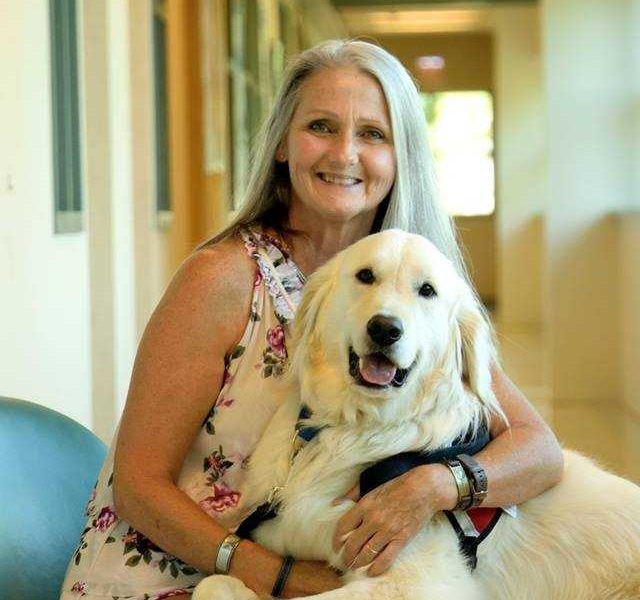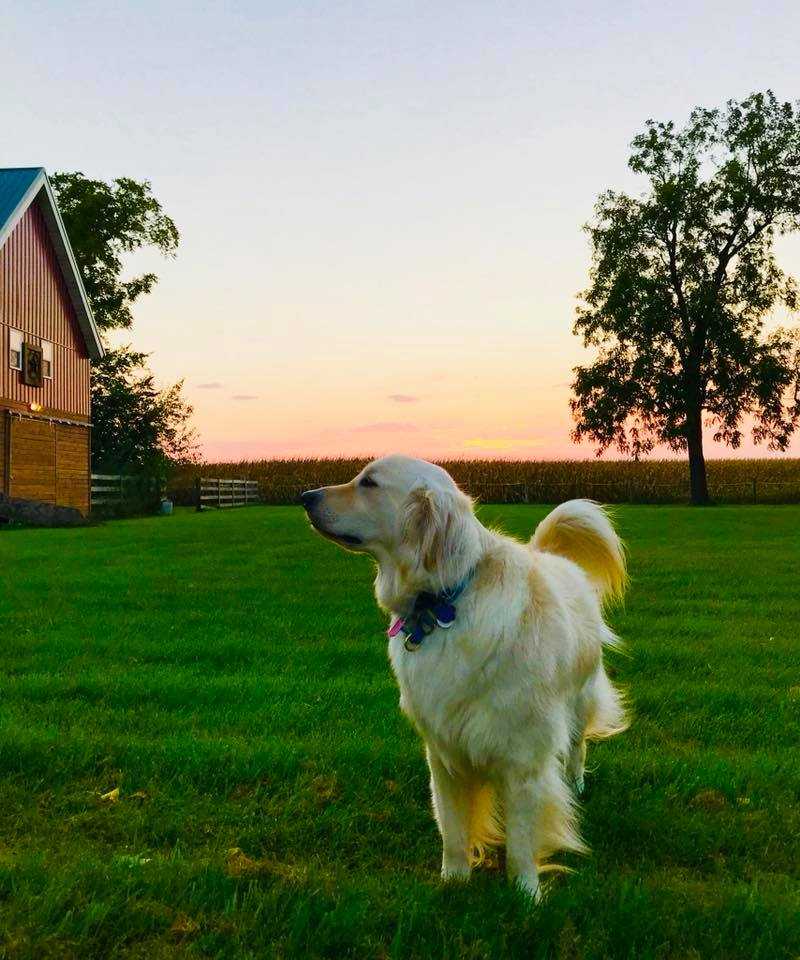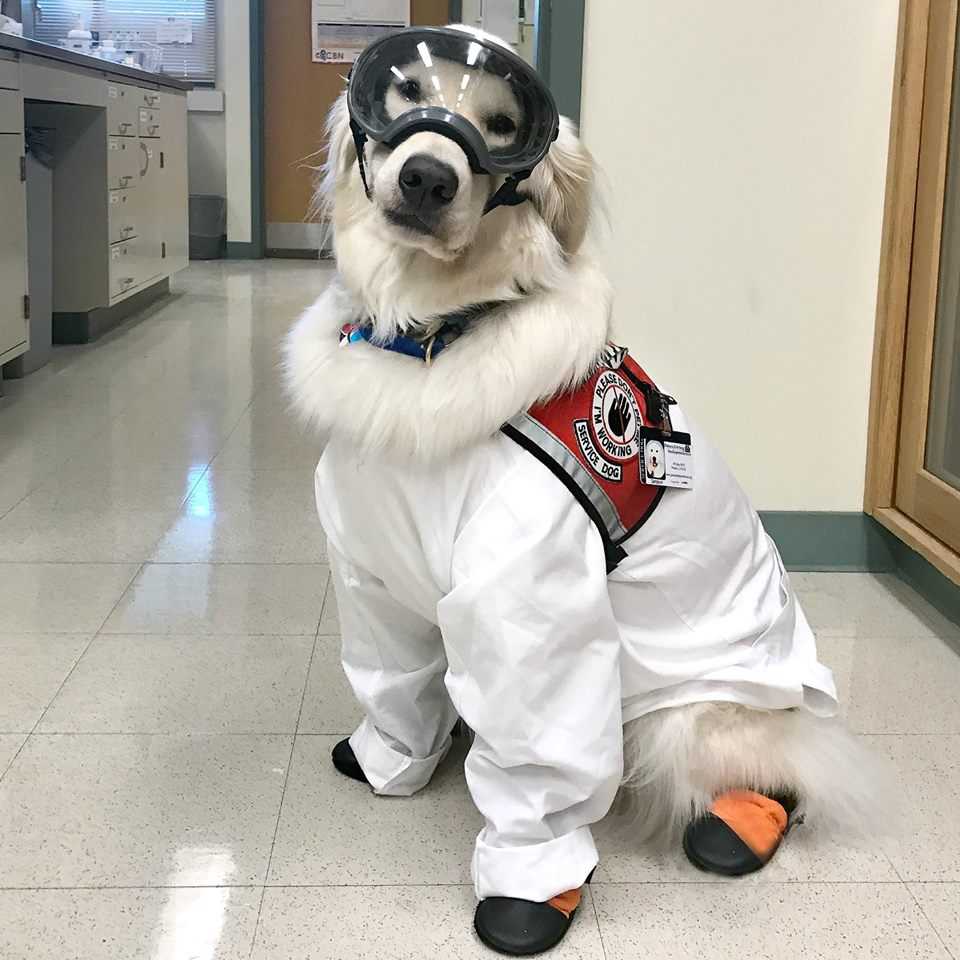
Sampson, a Golden Retriever, is one of five, loyal companion dogs who won the 19th annual AKC Humane Fund Awards for Canine Excellence (ACE). The winners will be honored at the AKC National Championship presented by Royal Canin in Orlando, Florida, December 15-16, 2018.
Animals have always been a vibrant part of Joey Ramp’s life. One almost killed her, two others have been her guiding lights and a third — on a book cover — saved her life.
Ramp, of Foosland, Illinois, and her Golden Retriever, Sampson, the winners of the 2018 American Kennel Club’s ACE (Awards for Canine Excellence) Service Dog honor, characterizes “Sampson is like a mirror for me. I can see my emotions in his face. If I am upset, angry or frustrated, it shows on him. If I am calm, happy and OK, he reflects that, too.”
Since February 14, 2006, when she fell off a horse in Lockhart, Texas, Ramp’s life has been a trajectory of spirited challenge, despair, and hope. But it was not until 2010 when she turned the emotional corner toward an active and rewarding life again. That’s when she contacted Paws Giving Independence in Peoria, Ill., which started her down a life with a service dog she could have never imagined. But that was not without a catalog of challenges, too.
Back to 2006. Ramp, a single mother of a 15-year-old son and 18-year-old daughter, was training seven polo horses for a Texas rancher. She was aboard Colorado, a 3-year-old polo horse, after having worked six others. As he started walking along a gravel road, a large wind gust blew in, forcing a metal trailer door to swing in and slam against the trailer. Colorado spooked and tried to back up, but his hooves slipped out in front of him, and his lower half went down. She went over his shoulder, and they both fell on the road.
“My head hit first, which was about the only thing I remember hurting. Your life does flash before your eyes, however,” she says. “I thought about my son being left alone if I died,” she recalls. The final toll read: broken arm in three places; displaced, broken ribs; fracture vertebrae; fractured jaw; fractured and broken eye socket and cheekbone; separated and fractured clavicle; seven shattered teeth; displaced left hip; and a concussion that led to multiple future complications. She was also let go from her job as a result of the injuries.

What followed were multiple surgeries on a two-year recovery road. Add to that being a jobless single mom who segued to making and selling cookies twice a week downtown, merely to put food on the table. Eventually, she received a settlement from her insurance company.
Following a back operation, she met her now life partner, Kenny Ramp, and they moved to Illinois with her son. But what promised to be an upbeat move, reverted to a challenging new landscape. “I started declining mentally,” Ramp explains. “I was losing time, disassociating, failing to remember things and passing out. I even fell down stairs and became panicked in public.”
At this point, she was under the care of a physician and was taking five prescriptions to control the pain. Today she battles chronic pain with “minimal medication.”
Eventually, she was diagnosed with Post-traumatic stress disorder, triggering severe depression.
“PTSD has a way of making a person feel like nothing makes sense. How you feel, how you react, the things you used to be able to do but can’t do anymore. It was like living in a ‘gingerbread man suit.’ I was on the inside but this ‘gingerbread man’ controlled everything from the outside.”
Her depression began to trigger thoughts of suicide to the climactic point that one day she pulled out her life-insurance policy and loaded a 9-millimeter handgun. She described those harrowing moments:
“I sat down on the floor of my office with my three Wolfhounds and knew it was time. My therapist, weeks before had recommended the book, ‘Until Tuesday: A Wounded Warrior and the Golden Retriever Who Saved Him” to me. I bought it but never read it.
“As I got set to pull the trigger, I looked over, and the face of Tuesday was looking back at me. Why I picked it up, I don’t know. But the words on the inside cover jacket made me think. It was about a dog and man bond that healed psychological wounds. It talked about understanding and recovery. That made sense. I didn’t put the book down until I finished it.
“I started to think how can I change my life? What can I do? I began searching jobs and careers and realized I needed an education.”
Ramp went back to college (her previous degree was in Secondary Education, Social Science, 1995-2000) to study PTSD and Neuroscience and found herself with a whole new set of challenges — gaining permission from the University of Illinois Beckman Institute for Advanced Science and Technology to allow Sampson in the laboratory alongside her.

But first things first. After Ramp’s narrow brush with suicide, she was convinced a service dog was her best option for confronting the mental and physical dynamics of challenge in her life. She turned to Paws Giving Independence and discovered she did not qualify for one since she had more than one dog in her household — three Wolfhounds and Kenny Ramp had two Labrador Retrievers, Theo, an 8-month-old puppy, and Neo, 2.
She was able to rehome the three Wolfies, for which she still carries guilt. “I always felt they thought I betrayed them,” she says. “I loved them deeply and cried for days after letting go.”
But the two Labradors remained a part of their household, which still disqualified her from receiving a service dog from PGI. Because she had a dog-training background, PGI suggested she begin training the engaging Theo, with its guidance. He went on to become a rock-star puppy and the first service dog at Parkland (Ill.) Community College. In the process, Theo, outfitted in safety goggles and boots, was permitted to enter laboratories and later became the first service dog at the University of Illinois to be allowed in chemistry labs, too. They worked side-by-side for three years.
A short time later in 2015, Theo incurred a lung disorder, which Ramp suspected was from black mold in the carpet of a rental house in which they resided. He had to be retired because of breathing issues, leaving Ramp without a service dog. Enter 18-month-old Sampson from PGI.
“He was unique,” she recalls. “He had a challenging and spirited ‘this is the best day ever’ attitude which required a strong handler who could guide him to the potential PGI recognized in him.”
Sam and Joey’s journey necessitated a firm commitment — she had to accumulate a minimum of 25 training hours before he could be placed in her home and she was mandated to attend monthly training sessions in Peoria for a year. Additionally, the team was required to undergo two training sessions, two outings with the organization and Public Access testing annually.
Sam and Ramp are 24/7 Velcro mates today. They reside in a barn apartment surrounded by open pastures and corn fields. And plenty of wildlife in the surrounding countryside.
Sam accompanies Joey to class daily but his laboratory access is limited as a result of university policy, which prompted Ramp to hire an attorney and file a discrimination complaint to the Department of Education, Office for Civil Rights in May. That matter remains unresolved. They spend eight to 16 hours a day together at school while she is studying and performing research in the Rhodes Lab at the Beckman Institute for Advanced Sciences and Technology five to six days a week. Sampson wears a lab coat, boots and goggles while in the lab.
After this semester, she has only two classes and research hours needed to graduate in Spring 2019 in Biocognitive Neuroscience with Distinction, the culmination of eight years of study.
“He and I are one. He gives me my independence, which means I don’t have to rely so heavily on others. I can do my own grocery shopping or meet friends for dinner, or get to school and my job at the laboratory.”
In return, Ramp’s daily regimen includes posting morning updates on Sampson’s Facebook page for his big fan base, in addition to brushing him, wiping his ears with a wet wipe and brushing his teeth. In other words, a full makeover.
“I talk to him all the time,” she laughs. “People must sometimes wonder because I carry on a constant conversation. I do get some strange looks occasionally.”
In public, Sampson helps Ramp manage her symptoms. When she is walking through a store, she can spot his body language and recognize when someone is approaching from another aisle or from behind. He alerts to rising anxiety, panic or disassociation by nudging her leg or hand. He also assists with counterbalance. “When I become highly stressed sometimes I get a type of vertigo from the head injury,” she explains.
“He’s my empowering relief valve 24/7 and has given me a reason to keep living. What more can you ask of your soul mate?”

